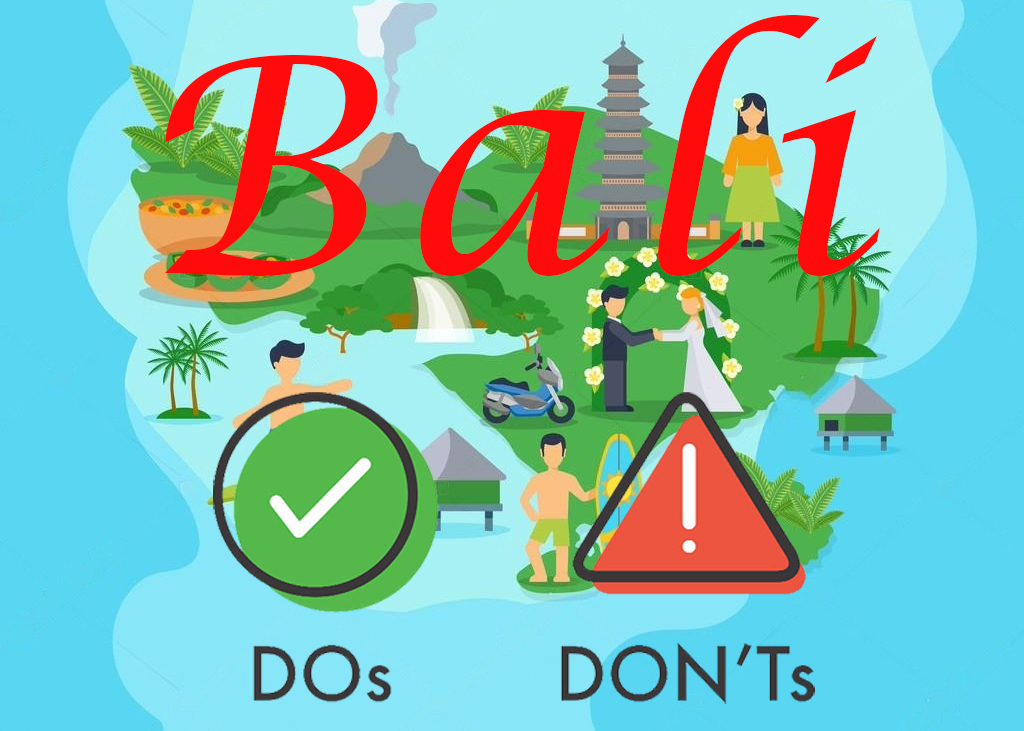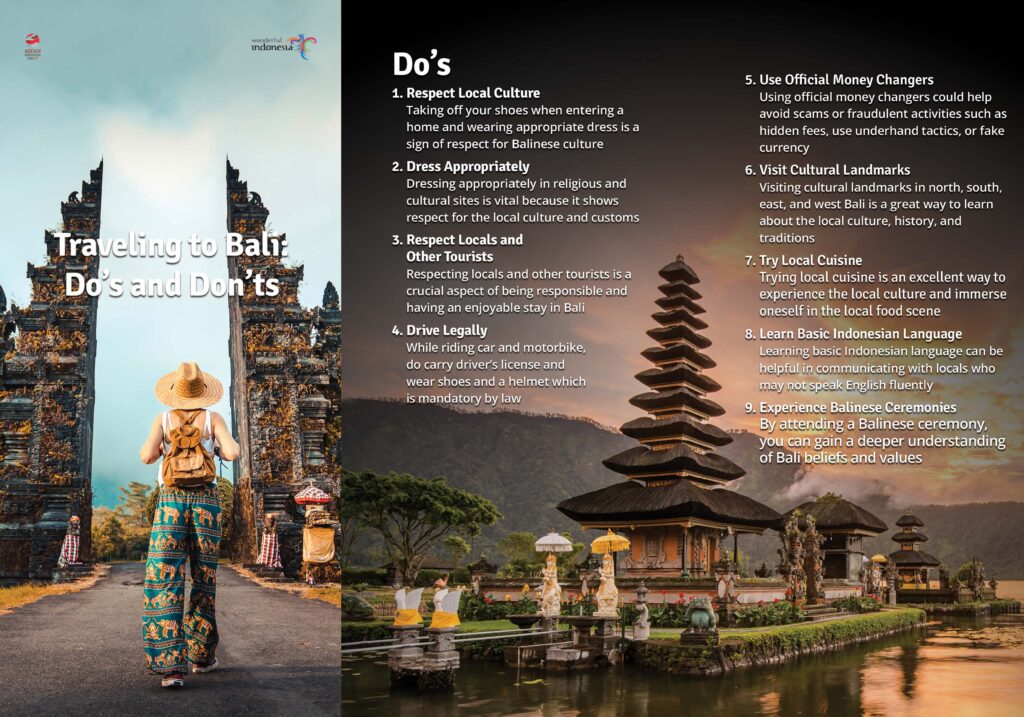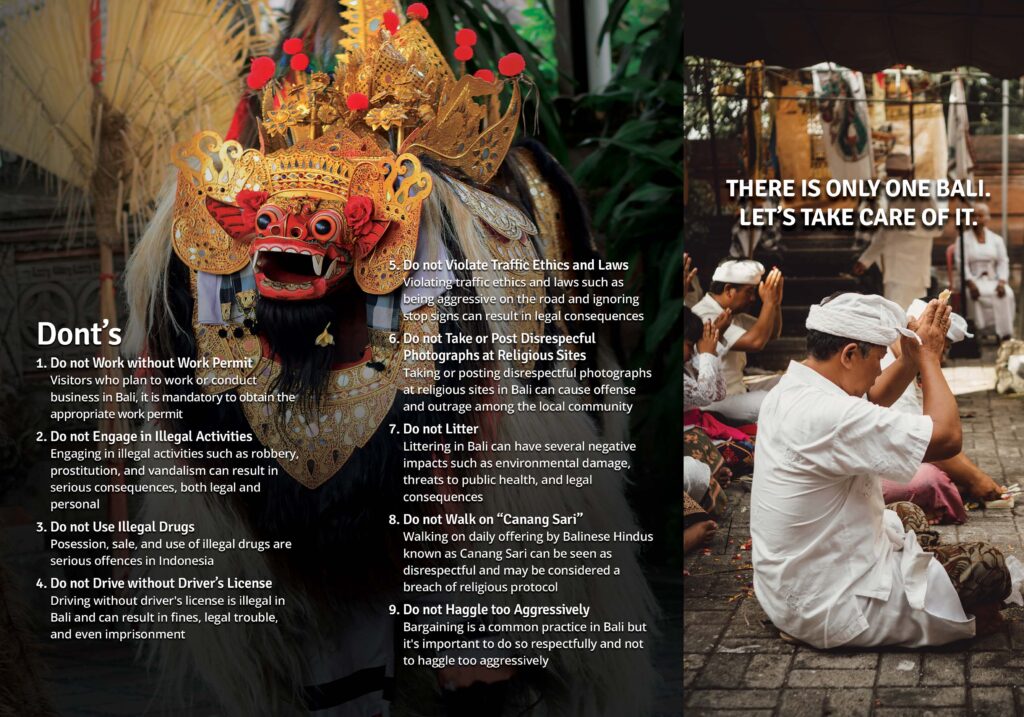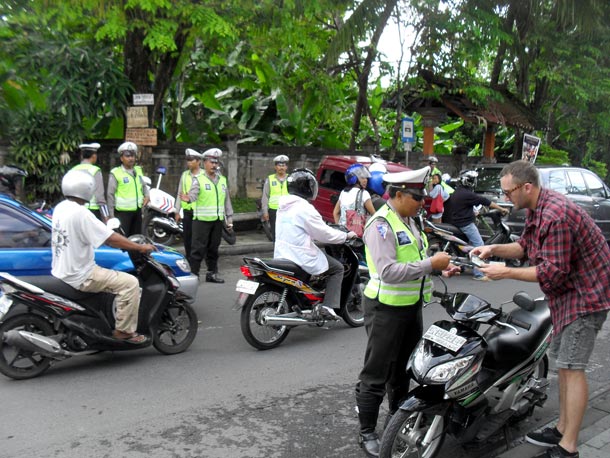Renowned as the ‘Island of Gods’, Bali has long captured the hearts of globetrotters with its breathtaking panoramas, awe-inspiring temples, pristine beaches, and vibrant cultural fabric. This magical island, while inviting guests from every corner of the world to immerse themselves in its bewitching allure, also emphasizes the importance of respecting its deeply ingrained traditions and customs.
However, in recent months, an uptick in incidents involving unthinking tourists and imprudent expatriates has been observed. To curb this unfortunate trend, the Ministry of Tourism and Creative Economy has stepped up and issued a comprehensive list of Do’s and Don’ts. This initiative aims to foster a culture of respect and mindful tourism, and the guidelines will be extensively promoted throughout the island.


Do’s in Bali
1. Respect Local Culture
Balinese culture is unique and deeply spiritual, with roots that can be traced back thousands of years. Always be respectful to the local customs and traditions, whether you are visiting a temple, attending a traditional ceremony, or simply walking around a local village. This respect will ensure that your interactions with locals remain positive and enjoyable.
2. Dress Appropriately
When entering temples or attending ceremonies, make sure to dress appropriately. This usually means covering your shoulders and wearing a sarong (a traditional garment worn around the waist) which is often provided at temple entrances. Remember, your dress is a reflection of your respect for the local culture.
3. Respect Locals and Other Tourists
Always maintain a cordial behavior with locals and fellow tourists. Being polite, respecting personal space, and using proper manners goes a long way in building pleasant interactions.
4. Drive Legally
When driving in Bali, make sure you are following local traffic rules and regulations. Driving in Bali can be chaotic, and adhering to traffic laws ensures everyone’s safety.
5. Use Official Money Changers
Bali has numerous money changing services, but not all are reliable. To avoid scams, always use official money changers that are licensed by the government.

6. Visit Cultural Landmarks
Bali is dotted with countless cultural landmarks – from ancient temples and royal palaces to vibrant markets and artisan villages. Exploring these can provide a deeper understanding of Bali’s rich cultural heritage.
7. Try Local Cuisine
From satay to nasi goreng, Balinese cuisine is a diverse and delicious blend of flavors. Don’t miss the chance to try local dishes and indulge in this unique culinary adventure.
8. Learn Basic Indonesian Language
While English is widely spoken in tourist areas, learning some basic Indonesian phrases can enhance your interactions with locals and make your experience more immersive.
9. Experience Balinese Ceremonies
The Balinese have a rich tradition of ceremonies, from religious rites to local festivals. Attending these can provide a unique glimpse into Balinese culture and spirituality.

Don’ts in Bali
1. Don’t Work Without a Working Permit
Working in Bali without a valid working permit is illegal. Always ensure you have the proper documentation before undertaking any employment.
2. Do Not Engage in Illegal Activities
This might seem obvious, but it’s worth repeating. Engaging in any form of illegal activities is strictly forbidden and could result in heavy penalties or imprisonment.
3. Do Not Use Illegal Drugs
Indonesia has very strict laws against drug use, including severe penalties that could include death. Steer clear of illegal drugs at all times.
4. Do Not Drive Without a License
Driving without a valid international driving license is illegal in Bali and could result in heavy fines. Ensure you have proper documentation before you hit the road.
5. Do Not Violate Traffic Laws
Traffic laws are in place for everyone’s safety. Make sure to adhere to them to avoid accidents and unnecessary fines.

6. Do Not Take or Post Disrespectful Photos at Religious Sites
Respect for religious and sacred sites is paramount in Bali. Never take or post disrespectful photos that could offend locals or violate cultural norms.
7. Do Not Litter
Keep Bali beautiful by not littering. Dispose of your trash properly in designated bins and help maintain the island’s natural beauty.
8. Do Not Walk on Canang Sari
Canang Sari are small, palm-leaf baskets filled with flowers and incense, presented as daily offerings by the Balinese to their gods. They are sacred, so do not step on or disturb them.
9. Do Not Haggle Too Aggressively
While haggling is common in Bali’s markets, don’t overdo it. Respect the vendors’ livelihoods and strive for a price that is fair for both parties.
Bali is a beautiful paradise that opens its arms to tourists from all walks of life. By following these do’s and don’ts, you can enjoy your trip and contribute positively to the preservation of Bali’s unique culture and environment. Happy travels!
 If you’re planning a trip to Bali and Indonesia, and looking for exceptional assistance in organizing tours and activities, Jans Tour is here to help. As a specialist in Indonesia, we offer a wide range of personalized travel solutions to meet your every need. From exploring Bali’s rich culture and breathtaking landscapes to adventure activities and relaxing escapes, our experienced team of professionals is dedicated to creating an unforgettable experience for you.
If you’re planning a trip to Bali and Indonesia, and looking for exceptional assistance in organizing tours and activities, Jans Tour is here to help. As a specialist in Indonesia, we offer a wide range of personalized travel solutions to meet your every need. From exploring Bali’s rich culture and breathtaking landscapes to adventure activities and relaxing escapes, our experienced team of professionals is dedicated to creating an unforgettable experience for you.
Contact us today to start planning your dream vacation in Bali with Jans Tour!


